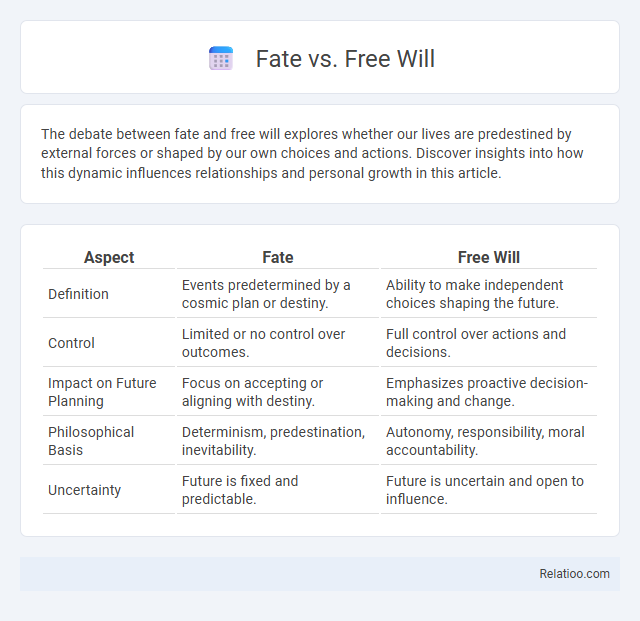The debate between fate and free will explores whether our lives are predestined by external forces or shaped by our own choices and actions. Discover insights into how this dynamic influences relationships and personal growth in this article.
Table of Comparison
| Aspect | Fate | Free Will |
|---|---|---|
| Definition | Events predetermined by a cosmic plan or destiny. | Ability to make independent choices shaping the future. |
| Control | Limited or no control over outcomes. | Full control over actions and decisions. |
| Impact on Future Planning | Focus on accepting or aligning with destiny. | Emphasizes proactive decision-making and change. |
| Philosophical Basis | Determinism, predestination, inevitability. | Autonomy, responsibility, moral accountability. |
| Uncertainty | Future is fixed and predictable. | Future is uncertain and open to influence. |
Understanding Fate: Definitions and Origins
Understanding fate involves exploring its definition as a predetermined course of events that shapes human destiny, often rooted in ancient mythologies and religious beliefs. Different cultures interpret fate uniquely, with Greek mythology attributing it to the Moirai, while Eastern traditions view it as karmic consequences influencing your life's path. Recognizing these diverse origins can deepen your insight into how fate is perceived across societies and its impact on free will debates.
The Concept of Free Will Explained
Free will refers to the ability of individuals to make choices independent of external constraints or predetermined fate, emphasizing personal autonomy in decision-making. Philosophers and psychologists debate the extent to which free will exists, with some arguing that biological, environmental, and cultural factors shape or limit this freedom. Cultural differences significantly influence the perception of free will, where collectivist societies may prioritize communal obligations over individual choice, contrasting with the individualistic focus seen in Western cultures.
Fate vs Free Will: Philosophical Perspectives
Philosophical perspectives on fate versus free will explore whether human actions are predetermined by external forces or if individuals possess genuine autonomy in decision-making. Determinism argues that every event, including human choices, is causally determined by an unbroken chain of prior occurrences, while libertarian free will asserts that individuals can act independently of such constraints. Understanding these views can help you navigate the complex interplay between destiny and personal responsibility shaped by cultural interpretations of choice and inevitability.
Historical Debates on Fate and Free Will
Historical debates on fate versus free will have shaped philosophical and theological discourse for centuries, with thinkers like Aristotle arguing for a blend of determinism and personal agency. Ancient cultures, such as the Greeks and Romans, often viewed fate as an immutable cosmic order, while Eastern traditions like Hinduism and Buddhism emphasized karma and moral causality influencing free will. Understanding these diverse perspectives helps you appreciate how cultural differences influence interpretations of human autonomy and destiny.
Religious Interpretations of Fate and Free Will
Religious interpretations of fate and free will vary significantly across cultures, with many traditions framing fate as divine predestination controlled by a supreme being, such as in Islam, where Qadar defines a preordained destiny balanced by human free will. In Christianity, doctrines often emphasize free will granted by God, allowing individuals to choose between good and evil, while still considering God's omniscient plan. Hinduism integrates karma and dharma, suggesting a dynamic interplay between predetermined cosmic order and personal freedom shaped by ethical actions.
Scientific Views: Destiny or Choice?
Scientific views on fate versus free will often explore the balance between genetic predispositions and environmental influences shaping human behavior, suggesting that your actions result from complex neural processes rather than predetermined destiny. Neuroscience reveals that while certain decisions are influenced by unconscious brain activity, your conscious choices still play a crucial role in shaping outcomes, influenced by cultural contexts that affect decision-making frameworks. Studies in psychology and anthropology emphasize that cultural differences significantly impact perceptions of fate and choice, showing how societal norms shape whether individuals see their futures as predetermined or within their control.
The Role of Fate in Literature and Art
Fate often shapes narrative arcs in literature and art by illustrating predetermined outcomes that challenge characters' autonomy and highlight cultural beliefs about destiny. Iconic works like Sophocles' "Oedipus Rex" and the paintings of the Pre-Raphaelites emphasize the inescapable nature of fate, underscoring its influence on human experience across societies. Understanding the role of fate in these genres enriches your appreciation of how different cultures interpret the balance between destiny and free will.
Psychological Impacts: Belief in Fate or Free Will
Belief in fate often leads to a sense of acceptance and reduced anxiety by attributing life events to predetermined forces, while belief in free will fosters empowerment and proactive decision-making, promoting psychological resilience. Cultural differences significantly shape these beliefs, with collectivist societies tending to emphasize fate and external control, resulting in higher communal support but sometimes increased fatalism. In contrast, individualistic cultures prioritize free will, encouraging personal responsibility but also potentially increasing stress and self-blame during failures.
Fate and Free Will in Modern Society
Fate and free will remain central debates in modern society, influencing individual decisions and cultural narratives. Scientific advancements and psychological research explore how deterministic factors and personal agency shape life outcomes, highlighting that your choices coexist with external circumstances. Cultural differences impact the emphasis placed on fate or free will, with some societies valuing predestination while others champion autonomy and self-determination.
Striking a Balance: Can Fate and Free Will Coexist?
Fate and free will can coexist through the concept of compatibilism, which suggests that predetermined events set the framework within which human choices operate. Cultural differences shape how societies interpret this balance, with some emphasizing destiny's dominance and others highlighting individual agency. Striking a balance involves recognizing that fate may influence circumstances while free will governs responses, creating a dynamic interplay shaped by cultural perspectives.

Infographic: Fate vs Free Will
 relatioo.com
relatioo.com